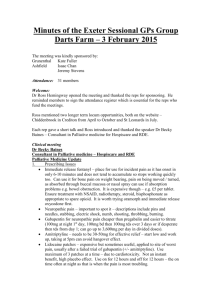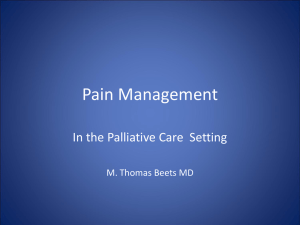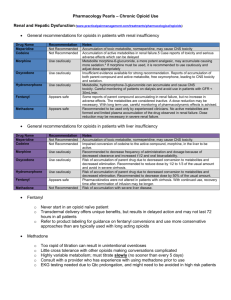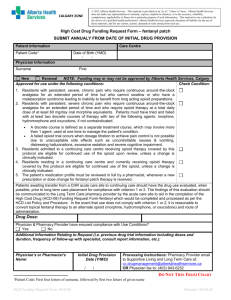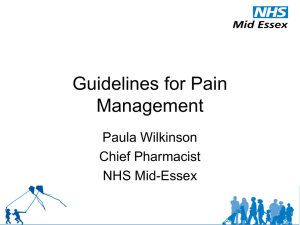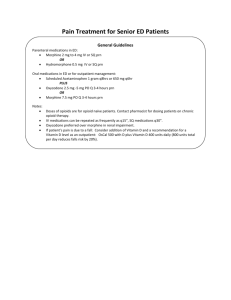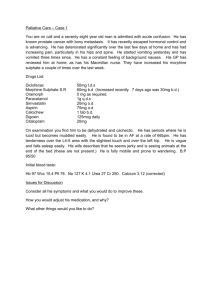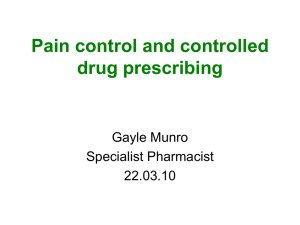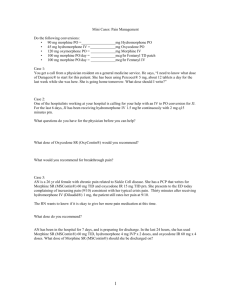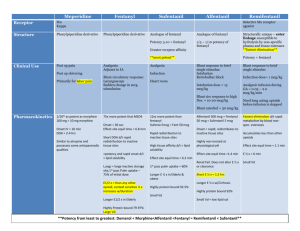Opioid Conversion Guidelines
advertisement
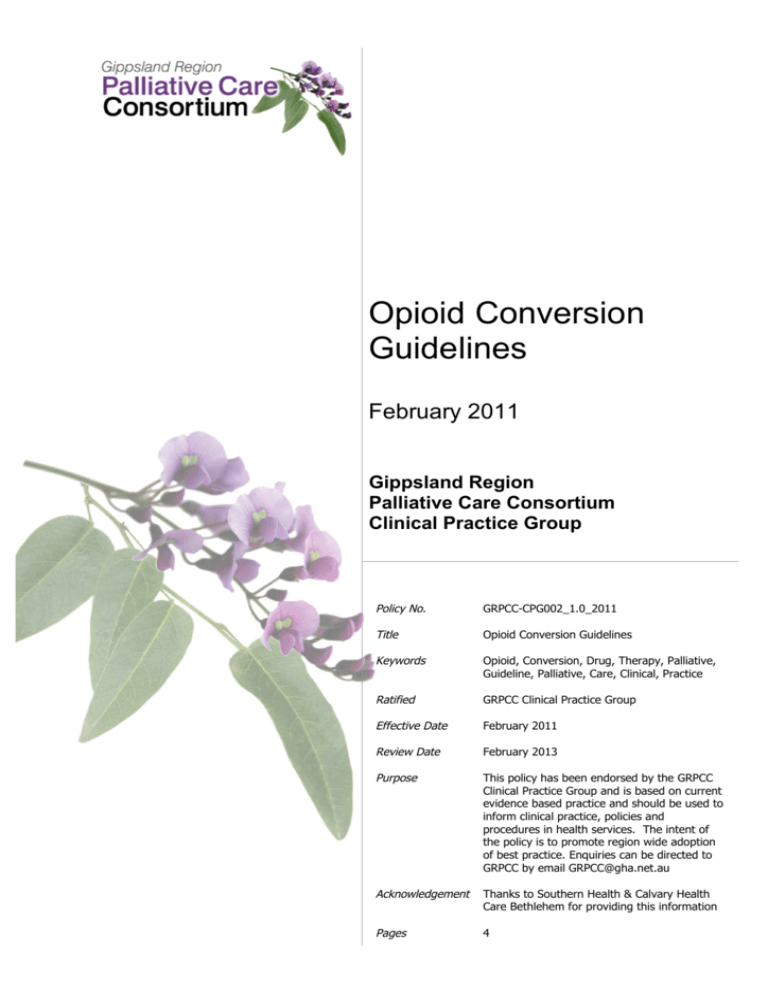
Opioid Conversion Guidelines February 2011 Gippsland Region Palliative Care Consortium Clinical Practice Group Policy No. GRPCC-CPG002_1.0_2011 Title Opioid Conversion Guidelines Keywords Opioid, Conversion, Drug, Therapy, Palliative, Guideline, Palliative, Care, Clinical, Practice Ratified GRPCC Clinical Practice Group Effective Date February 2011 Review Date February 2013 Purpose This policy has been endorsed by the GRPCC Clinical Practice Group and is based on current evidence based practice and should be used to inform clinical practice, policies and procedures in health services. The intent of the policy is to promote region wide adoption of best practice. Enquiries can be directed to GRPCC by email GRPCC@gha.net.au Acknowledgement Thanks to Southern Health & Calvary Health Care Bethlehem for providing this information Pages 4 Policy Statement Equianalgesic dose conversions are necessary when changing opioid drug therapy in the clinical setting. Definitions Opioid analgesics vary in potency, side effect and pharmacokinetic profile. Therefore the Opioid Conversion Guidelines has been developed to assist when changing opioid drug therapy. Policy PROCEDURE When rotating opioids for intolerable side effects or inadequate analgesia, it is advisable to reduce the dose of the new opioid by 25-50% due to incomplete crosstolerance. There should be adequate provision made for breakthrough medication and the patient should be monitored closely. Please note that all conversions in these guidelines are a guide only. Medication doses should be modified in response to the patients’ clinical condition and previous exposure to opioids. Oral to Oral Oral to Oral Ratio Example Oral Tramadol to Oral Morphine to 5:1 Oral Tramadol 50mg =Oral Morphine 10mg Oral Codeine to Oral Morphine 8:1 Oral Codeine 60mg = Oral Morphine 7.5mg Oral Morphine to Oral Methadone ? Complex pharmacology, discuss with Consultant. Dose requires to be titrated. Oral Morphine to Oral Oxycodone 1.5 : 1 Oral Morphine 15mg = Oral Oxycodone 10mg Oral Morphine to Oral Hydromorphone 5:1 Oral Morphine 5mg = Oral Hydromorphone 1mg Oral to Subcutaneous Ratio Example Oral Morphine to SC Morphine 2-3 : 1 Oral Morphine 20-30mg = SC Morphine 10mg Oral Methadone to SC Methadone 1.5 : 1 Oral Methadone 20mg = SC Methadone 15mg Oral Hydromorphone to SC Hydromorphone 4:1 Oral Hydromorphone 4 mg = SC Hydromorphone 1mg Oral Oxycodone to SC Oxycodone 2:1 Oral Oxycodone 20mg = SC Oxycodone 10mg Oral to Subcutaneous Subcutaneous to Subcutaneous Subcutaneous to Subcutaneous Ratio Example SC Morphine to SC Hydromorphone 5:1 SC Morphine 10mg = SC Hydromorphone 2mg SC Fentanyl to SC Sufentanil 10 : 1 SC Fentanyl 100mcg = SC Sufentanil 10mcg SC Morphine to SC Fentanyl 70-100 : 1 SC Morphine 10mg = SC Fentanyl 100-150mcg SC Morphine to SC Oxycodone 1-1.5 : 1 SC Morphine 10-15mg = SC Oxycodone 10mg Opioid Conversion Guidelines GRPCC-CPG002_1.0_2011 Gippsland Region Palliative Care Consortium Page 2 of 4 Subcutaneous to Subcutaneous Ratio Example IM Pethidine to SC Morphine 10 : 1 IM Pethidine 100mg= SC Morphine 10mg Subcutaneous to Other Opioid Conversions Subcutaneous to Other Ratio Example SC or SL Fentanyl to TTS Fentanyl 1:1 Fentanyl 600mcg/24 hr CSCI = Fentanyl patch 25mcg/hr SC Sufentanil to SL Sufentanil 1:1 Sufentanil 10mcg CSCI = Sufentanil SL 10mcg TTS = Transdermal Therapeutic System CSCI = Controlled Subcutaneous Infusion Opioid Patch & Equivalent Morphine / Oxycodone Doses Strength TTS Medication Delivery Rate (micrograms/hour) SC Morphine (mg/24 hours) Oral Morphine (mg/24 hours) Oral Oxycodone (mg/24 hours) Durogesic 12 Fentanyl 12 10 - 20 20 - 60 15 - 40 Durogesic 25 Fentanyl 25 30 - 40 60 - 100 40 - 70 Durogesic 50 Fentanyl 50 60 - 80 120 - 200 80 - 140 Durogesic 75 Fentanyl 75 90 - 120 180 - 300 120 - 200 Durogesic 100 Fentanyl 100 120 - 160 240 - 400 180 - 270 Norspan 5 Buprenorphine 5 9 - 13 5 - 10 Norspan 10 Buprenorphine 10 18 - 26 10 - 20 Norspan 20 Buprenorphine 20 36 - 53 25 – 40 After application of the fentanyl patch peak plasma levels are achieved ~ 24 hours (significant plasma levels occur in 12 to 16 hours). Buprenorphine patch takes 3 days to achieve its steady state. On removal serum elimination half lives are: fentanyl 15 – 20 hours: buprenorphine 12 hours. Oral opiates should not be started until at least 12 hours following removal of either patch (excluding breakthroughs). Regular oral analgesia needs to be continued for 12-24 hours after commencing either patch. FORMULA for calculating SUFENTANIL Break-Through Doses (BTD) for a given Fentanyl Patch For a given Fentanyl Patch of x mcg/hr: BTD = x/5 micrograms of Sufentanil 2 hourly e.g. for Durogesic 25: BTD = 25/5 i.e 5 microgram Sufentanil 2 hourly Break-Through Doses should not exceed 40 micrograms Sufentanil Sufentanil is available as 250 mcg/5ml – i.e. 50 mcg/ml Opioid Conversion Guidelines GRPCC-CPG002_1.0_2011 Gippsland Region Palliative Care Consortium Page 3 of 4 Oral Analgesic Preparations Drug Trade Name Release Rate Usual Frequency Presentation Buprenorphine Temgesic Immediate Every 6-8 hours 200mcg tablets Fentanyl Transmucosal Actiq Immediate Every 2 -3 hours 200,400,600, 800mcg lozenges Hydromorphone Dilaudid Immediate Every 2-3 hours 2,4,8mg tabs, 1mg/ml mixt Jurnista Slow Release Every 24 hours 8,16,32,64 mg tablets Methadone Physeptone Immediate Every 12 hours 10mg tablets, 5mg/ml mixt Morphine MS Contin Slow Release Every 12 hours 5, 10, 15, 30, 60, 100, 200mg tab MS Contin Suspension Slow Release Every 12 hours 20, 30, 100mg sachet MS Mono Slow Release Every 24 hours 30, 60, 90, 120mg capsule Kapanol Slow Release Every 12-24 hours 10, 20, 50, 100mg capsule Anamorph Immediate Every 4-6 hours 30mg tablet Sevredol Immediate Every 4-6 hours 10, 20mg tablets Ordine Immediate Every 2-4 hours 1mg, 2mg, 5mg,10mg/ml mixture OxyContin Slow Release Every 12 hours 5, 10, 20, 40, 80mg tablet Endone Immediate Every 4-6 hours 5mg tablet OxyNorm Immediate Every 4-6 hours 5, 10, 20mg capsule. 5mg/5ml Liquid Tramal/Zydol Immediate Every 4-6 hours 50mg tablet Tramal SR / Zydol SR Slow Release Every 12 hours 100mg, 150mg, 200mg tablet Oxycodone Tramadol References / Supporting Framework 1. 2. 3. 4. 5. 6. 7. 8. Analgesic Therapeutic Guidelines. Edition 4. Melbourne. 2002 Palliative Care Therapeutic Guidelines. Edition 2. Melbourne 2005. Australian Medicines Handbook. 2007 Product information. Mims [On-Line] Available: http://mims.hcn.net.au [2007,May] Palliative Care Formulary, www.palliativedrugs.com Narcotic analgesic, equianalgesic doses and pharmacokinetic comparison. Micromedex [On-Line] Available: http://micromedex.hcn.net.au [2007, May] Opioid Conversion Ratios – Guide to Practice 2010, Eastern Metropolitan Region Palliative Care Consortium. Melbourne 2010. Available online at: http://www.emrpcc.org.au/viewresources.asp?id=7 [2011, Feb) Opioid Conversion Guidelines GRPCC-CPG002_1.0_2011 Gippsland Region Palliative Care Consortium Page 4 of 4
